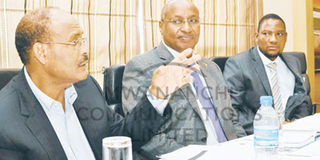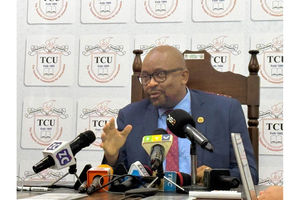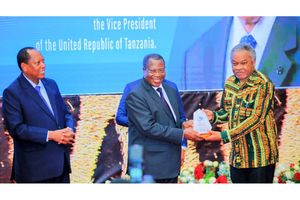World Bank roots for correct data

The African Economic Research Consortium executive director, Prof Lemma Senbet (left), speaks during a workshop on data in Dar es Salaam yesterday. Looking on are Repoa executive director Dr Donald Mmari and Dr Witness Simbanegavi. PHOTO | SAID KHAMS
What you need to know:
To address the problem, the World Bank has teamed up with Repoa and African Economic Research Consortium (AERC) for the project to build capacity of experts and policy analysts in preparing and disseminating correct data that will guide policy makers in improving health and education services delivery.
Dar es Salaam. The World Bank’s project on data analysis has found that Tanzania and other African countries have a weak capacity for measuring the performance of education and medical care.
To address the problem, the World Bank has teamed up with Repoa and African Economic Research Consortium (AERC) for the project to build capacity of experts and policy analysts in preparing and disseminating correct data that will guide policy makers in improving health and education services delivery.
Repoa executive director Donald Mmari said yesterday that the World Bank was supporting Repoa and AERC in training experts who would help to improve the work of data collection, analysis and dissemination for improving delivery of education and health services in the country.
“There are two missing gaps in the struggle to improve education and health services. One is the capacity to collect and disseminate correct data. For example, when we talk about free education the focus should be what is the impact of budgeted funds on the quality of education,” said Dr Mmari.
He added: “Even in the health services delivery, the focus should be on the quality of services, proper diagnosis of sick people and people’s accessibility to proper medication.
“It is wrong to say that education and health services are improving by focusing only on the number of enrolled students, graduated students, number of hospitals and health centres. We have to focus on the quality of services delivered.
According to him, the experts will prepare best criteria and indicators for measuring performance of education and health services delivery.
For his part, the AERC executive director, Prof Lemma Senbet, said that the training project was aimed at supporting African countries to have capacity for Service Delivery Indicators (SDI) in the social services.
“This is a new Africa-wide flagship initiative that tracks service delivery in the two sectors across countries and over time in a comparable manner,” said Prof Senbet.
“It provides a new source of data on the quality and effectiveness of delivery of education and health services in Africa and is expected to enrich policy debates and discussions, as well as further research in these sectors,” he added.
He noted that sound SDIs were important for correct measurement of the country’s performance in the development of education and health services.
Mr Lucas Katella, research director for Repoa clarified that currently most of African countries, including Tanzania, have weak capacity to measure performance of education and health services delivery.
Repoa says there is a plan is to expand capacity for analysis.
and use of SDI data in national policy dialogue on education and health issues in Kenya, Nigeria and Tanzania.
On his part, executive director of AERC Prof Lemma Senbet said that the training project was aimed at supporting African countries to have capacity for Service Delivery Indicators (SDI) in the social services.
“This is a new Africa-wide flagship initiative that tracks service delivery in the two sectors across countries and over time in a comparable manner. It provides a new source of data on the quality and effectiveness of delivery of education and health services in Africa and is expected to enrich policy debates and discussions, as well as further research in these sectors,” said Prof Senbet.
He further said that sound SDIs were important for correct measurement of the country’s performance in the development of education and health services.
Mr Lucas Katella research director for Repoa clarified that current most of African countries including Tanzania have weak capacity to measure performance of education and health services delivery.
Repoa say there is a plan is to expand capacity for analysis .




